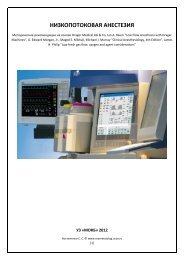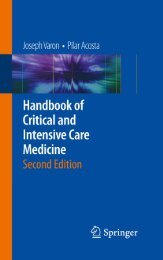- Page 2 and 3: This page intentionally left blank
- Page 5 and 6: Emergency Department Analgesia An E
- Page 7 and 8: Contents List of contributors page
- Page 9 and 10: Tension-type headache 384 Trigemina
- Page 11 and 12: Michel Galinski, MD Attending Physi
- Page 13: Benjamin A. White, MD Resident, Har
- Page 17 and 18: Foreword xv patients do not describ
- Page 19: Foreword xvii the way most new agen
- Page 22 and 23: xx Preface Text users seeking quick
- Page 24 and 25: xxii Abbreviations BID twice daily
- Page 27 and 28: Introduction and general approach t
- Page 29 and 30: Introduction and general approach t
- Page 31 and 32: Introduction and general approach t
- Page 33 and 34: Introduction and general approach t
- Page 35 and 36: numbers. More recently, the “Curs
- Page 37 and 38: Alternative coding 0 No hurt 1 Hurt
- Page 39 and 40: children who are cognitively impair
- Page 41 and 42: Assessment of pain 17 18. Marco C,
- Page 43 and 44: Prehospital analgesia CHRIS MCEACHI
- Page 45 and 46: n Barriers to prehospital pain reli
- Page 47 and 48: Prehospital analgesia 23 fracture h
- Page 49 and 50: Prehospital analgesia 25 moderately
- Page 51 and 52: Prehospital analgesia 27 3. McEachi
- Page 53 and 54: Prehospital analgesia 29 33. Ricard
- Page 55 and 56: Epidemiologic overview of pain trea
- Page 57 and 58: intractable delays in ED analgesia
- Page 59 and 60: As is the case with many of the oth
- Page 61 and 62: ates in children aged 6 to 10 years
- Page 63 and 64: In conclusion, the available eviden
- Page 65 and 66:
Epidemiologic overview of ED pain t
- Page 67 and 68:
patients, safe and effective geriat
- Page 69 and 70:
Geriatric analgesia 45 combined wit
- Page 71 and 72:
NSAIDs are widely prescribed, and f
- Page 73 and 74:
Reasonable: other opioids (not reco
- Page 75 and 76:
Geriatric analgesia 51 28. Buffum M
- Page 77 and 78:
Chronic pain 53 rest, immobilizatio
- Page 79 and 80:
Chronic pain 55 have recommended NS
- Page 81 and 82:
Chronic pain 57 for patients to see
- Page 83 and 84:
computerized records, increasing th
- Page 85 and 86:
NSAIDs and opioids BENJAMIN A. WHIT
- Page 87 and 88:
NSAIDs and opioids 63 For now, with
- Page 89 and 90:
NSAIDs and opioids 65 agent or anot
- Page 91 and 92:
pregnancy. For short-term use as pr
- Page 93 and 94:
NSAIDs and opioids 69 18. Collins J
- Page 95 and 96:
“nonstandard” administration ro
- Page 97 and 98:
approach in ED therapy of acute pai
- Page 99 and 100:
Nonstandard medication delivery 75
- Page 101 and 102:
Reflections on analgesia in emergen
- Page 103 and 104:
Reflections on ED analgesia 79 inte
- Page 105 and 106:
Reflections on ED analgesia 81 but
- Page 107:
Reflections on ED analgesia 83 want
- Page 111 and 112:
Abdominal aortic aneurysm BETH WICK
- Page 113 and 114:
Abdominal aortic aneurysm 89 3. Bow
- Page 115 and 116:
Aortic dissection KALANI OLMSTED AN
- Page 117 and 118:
Aortic dissection 93 5. Elliott WJ.
- Page 119 and 120:
dependent. Immobilization may reduc
- Page 121 and 122:
either NSAIDs or colchicine (for go
- Page 123 and 124:
Arthritis 99 achieved in a third of
- Page 125 and 126:
RHEUMATOID ARTHRITIS AND JUVENILE R
- Page 127 and 128:
Pregnancy: n acetaminophen (650-100
- Page 129 and 130:
References Arthritis 105 1. Man C,
- Page 131 and 132:
Arthritis 107 26. Furlan AD, Sandov
- Page 133 and 134:
Arthritis 109 50. Chevalier X, Gira
- Page 135 and 136:
Biliary tract pain STEPHEN H. THOMA
- Page 137 and 138:
CHOLECYSTOKININ RECEPTOR AGENTS Dru
- Page 139 and 140:
Biliary tract pain 115 7. Butler KC
- Page 141 and 142:
Bites and stings - marine STEPHEN H
- Page 143 and 144:
Bites and stings - marine 119 For j
- Page 145 and 146:
Special cases: n antivenom availabl
- Page 147 and 148:
Bites and stings - marine 123 26. F
- Page 149 and 150:
Bites and stings - terrestrial 125
- Page 151 and 152:
severe cramps associated with terre
- Page 153 and 154:
Bites and stings - terrestrial 129
- Page 155 and 156:
Bites and stings - terrestrial 131
- Page 157 and 158:
Breast pain JANET SIMMONS YOUNG n A
- Page 159 and 160:
A clinical trial found reduction or
- Page 161 and 162:
Breast pain 137 3. Parsa AA, Soon C
- Page 163 and 164:
Burns 139 well as assist in deconta
- Page 165 and 166:
opioids and benzodiazepines togethe
- Page 167 and 168:
Burns 143 16. Blanda M, Rench T, Ge
- Page 169 and 170:
Bursitis and periarticular inflamma
- Page 171 and 172:
Bursitis and periarticular inflamma
- Page 173 and 174:
Bursitis and periarticular inflamma
- Page 175 and 176:
Cancer and tumor pain MICHAEL WALTA
- Page 177 and 178:
Neither NCI nor Cochrane reviews fi
- Page 179 and 180:
Breakthrough pain is defined as int
- Page 181 and 182:
trial of ketamine (1 mg/kg daily) a
- Page 183 and 184:
Cancer and tumor pain 159 5. McNico
- Page 185 and 186:
Cancer and tumor pain 161 35. Hindl
- Page 187 and 188:
Cardiac chest pain 163 conclude tha
- Page 189 and 190:
n Summary and recommendations First
- Page 191 and 192:
Cardiac chest pain 167 15. Thomas S
- Page 193 and 194:
Chest wall trauma 169 bolus therapy
- Page 195 and 196:
Chest wall trauma 171 systemically
- Page 197 and 198:
Chest wall trauma 173 6. Mayberry J
- Page 199 and 200:
Chronic low-back pain DAVID CLINE n
- Page 201 and 202:
Chronic low-back pain 177 LBP for d
- Page 203 and 204:
Chronic low-back pain 179 chronic l
- Page 205 and 206:
comparing oxygen with inhaled room
- Page 207 and 208:
Cluster headache 183 7. Yonker ME.
- Page 209 and 210:
two trials finding better pain cont
- Page 211 and 212:
Corneal abrasion 187 20. Patterson
- Page 213 and 214:
Cystitis, urethritis, and prostatit
- Page 215 and 216:
population; if phenazopyridine is p
- Page 217 and 218:
Dysmenorrhea BENJAMIN A. WHITE AND
- Page 219 and 220:
Special case: n refractory pain: op
- Page 221 and 222:
Endometriosis JOSHUA H. TAMAYO-SARV
- Page 223 and 224:
Endometriosis 199 3. Olive DL, Lind
- Page 225 and 226:
Esophageal spasm 201 Calcium channe
- Page 227 and 228:
Esophageal spasm 203 3. Orlando RC,
- Page 229 and 230:
Fibromyalgia 205 Fibromyalgia pain
- Page 231 and 232:
Fibromyalgia 207 agonist pramipexol
- Page 233 and 234:
References Fibromyalgia 209 1. Maiz
- Page 235 and 236:
Fibromyalgia 211 29. Bennett RM, Sc
- Page 237 and 238:
Gastritis and peptic ulcer disease
- Page 239 and 240:
Gastritis and peptic ulcer disease
- Page 241 and 242:
Gastritis and peptic ulcer disease
- Page 243 and 244:
sucralfate was more effective than
- Page 245 and 246:
Gastritis and peptic ulcer disease
- Page 247 and 248:
Gastritis and peptic ulcer disease
- Page 249 and 250:
Gastroesophageal reflux disease KAL
- Page 251 and 252:
Gastroesophageal reflux disease 227
- Page 253 and 254:
Special cases: n patients requiring
- Page 255 and 256:
Gastroesophageal reflux disease 231
- Page 257 and 258:
Hemorrhoids and perianal pain 233 F
- Page 259 and 260:
Hemorrhoids and perianal pain 235 S
- Page 261 and 262:
Hemorrhoids and perianal pain 237 a
- Page 263 and 264:
Pediatric: fiber-containing laxativ
- Page 265 and 266:
Hemorrhoids and perianal pain 241 2
- Page 267 and 268:
Migraine and undifferentiated heada
- Page 269 and 270:
Migraine and undifferentiated heada
- Page 271 and 272:
treatment with opioids. It is often
- Page 273 and 274:
Migraine and undifferentiated heada
- Page 275 and 276:
Migraine and undifferentiated heada
- Page 277 and 278:
Migraine and undifferentiated heada
- Page 279 and 280:
Mucositis and stomatitis 255 discus
- Page 281 and 282:
Mucositis and stomatitis 257 diphen
- Page 283 and 284:
Special cases: n refractory CTAM: d
- Page 285 and 286:
Mucositis and stomatitis 261 18. Ba
- Page 287 and 288:
Neck and back pain - mechanical str
- Page 289 and 290:
or who are not candidates for NSAID
- Page 291 and 292:
Neck and back pain - mechanical str
- Page 293 and 294:
Neck and back pain - radicular synd
- Page 295 and 296:
Neck and back pain - radicular synd
- Page 297 and 298:
Neck and back pain - spinal spondyl
- Page 299 and 300:
n Summary and recommendations First
- Page 301 and 302:
Neuropathy - complex regional pain
- Page 303 and 304:
Neuropathy - complex regional pain
- Page 305 and 306:
Neuropathy - diabetic 281 confirms
- Page 307 and 308:
Neuropathy - diabetic 283 3. Gimbel
- Page 309 and 310:
Neuropathy - HIV related DAVID CLIN
- Page 311 and 312:
delay institution of optimal therap
- Page 313 and 314:
Neuropathy - overview SHARON E. MAC
- Page 315 and 316:
Opioid doses in NP may be relativel
- Page 317 and 318:
are also multicenter trial data sup
- Page 319 and 320:
LOCAL ANESTHETICS Neuropathy - over
- Page 321 and 322:
opioids), with sites of action in t
- Page 323 and 324:
Neuropathy - overview 299 14. Arnol
- Page 325 and 326:
Neuropathy - phantom limb pain DAVI
- Page 327 and 328:
topiramate had statistically signif
- Page 329 and 330:
Neuropathy - phantom limb pain 305
- Page 331 and 332:
topical NSAIDs useful for corneal a
- Page 333 and 334:
venom. 35 As long as they are used
- Page 335 and 336:
Ocular inflammation 311 7. Tauber J
- Page 337 and 338:
Ocular inflammation 313 of General
- Page 339 and 340:
Odontalgia 315 pain, trial evidence
- Page 341 and 342:
Odontalgia 317 single maxillary too
- Page 343 and 344:
n Summary and recommendations First
- Page 345 and 346:
Odontalgia 321 19. Ma M, Lindsell C
- Page 347 and 348:
Orthopedic extremity trauma - sprai
- Page 349 and 350:
Orthopedic extremity trauma 325 gen
- Page 351 and 352:
Pregnancy: n acetaminophen (650-100
- Page 353 and 354:
Orthopedic extremity trauma 329 22.
- Page 355 and 356:
Osteoporotic vertebral compression
- Page 357 and 358:
elief between pamidronate and calci
- Page 359 and 360:
Otitis media and externa KELLY YOUN
- Page 361 and 362:
n Summary and recommendations First
- Page 363 and 364:
Pancreatitis STEPHEN H. THOMAS AND
- Page 365 and 366:
cholangiopancreatography. 18 The ac
- Page 367 and 368:
Pancreatitis 343 19. Heinrich S, Sc
- Page 369 and 370:
Pharyngitis 345 PG) is the lozenge;
- Page 371 and 372:
Reasonable: n acetaminophen (1000 m
- Page 373 and 374:
Pharyngitis 349 19. Wei JL, Kasperb
- Page 375 and 376:
Postdural puncture headache SOHAN P
- Page 377 and 378:
References Postdural puncture heada
- Page 379 and 380:
Post-herpetic neuralgia 355 inciden
- Page 381 and 382:
Pediatrics: n 5% lidocaine patch (1
- Page 383 and 384:
Renal colic ANDREW WORSTER n Agents
- Page 385 and 386:
for analgesia. Unfortunately, avail
- Page 387 and 388:
Sialolithiasis SAMUEL KIM AND JOHN
- Page 389 and 390:
Sickle cell crisis HANS BRADSHAW AN
- Page 391 and 392:
panel are typical: D 5½NS (plus 20
- Page 393 and 394:
Sickle cell crisis 369 The first ro
- Page 395 and 396:
enefits of nalbuphine (adult dosage
- Page 397 and 398:
instituted at 25% of the hourly bol
- Page 399 and 400:
n morphine bolus dosing (initial do
- Page 401 and 402:
Sickle cell crisis 377 17. Jacob E,
- Page 403 and 404:
Sickle cell crisis 379 46. Griffin
- Page 405 and 406:
Temporomandibular disorders 381 wit
- Page 407 and 408:
Temporomandibular disorders 383 6.
- Page 409 and 410:
Tension-type headache 385 superior
- Page 411 and 412:
Tension-type headache 387 4. Cicek
- Page 413 and 414:
Trigeminal neuralgia SOHAN PAREKH A
- Page 415 and 416:
Trigeminal neuralgia 391 3. Kaminsk
- Page 417 and 418:
Undifferentiated abdominal pain 393
- Page 419 and 420:
Pregnancy: morphine (initial dose 4
- Page 421 and 422:
Undifferentiated abdominal pain 397
- Page 423 and 424:
Maintenance pediatric dose Maintena
- Page 425 and 426:
10-20 mg/kg daily, divided BID-TID
- Page 427 and 428:
2.5-10 mg q2-6 h 0.1-0.2 mg/kg q2-4
- Page 429 and 430:
If CrCl < 70 ml/min Venlafaxine Eff
- Page 431 and 432:
5 mL (500 mg) QID B Safe None 5 mL










